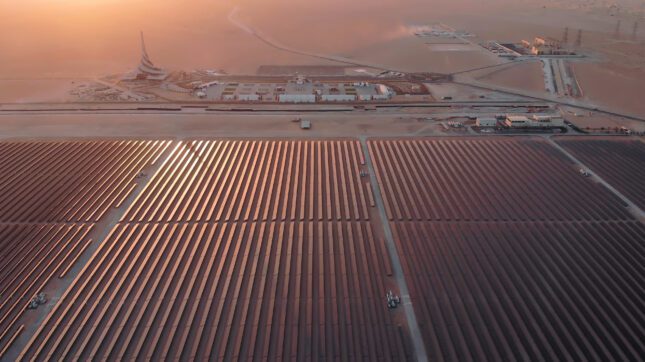-
Climate Priorities in the Middle East and North Africa: Takeaways from a New Occasional Paper
April 22, 2024 By Claire Doyle
In a new Occasional Paper published by the Wilson Center’s Middle East Program and ECSP, journalist Taylor Luck examines the climate priorities of wealthy and middle-income countries in the Middle East and North Africa (MENA). Luck analyzes the policies adopted by MENA states, highlighting gaps and offering recommendations to strengthen climate action in a region strained by both instability and climate change.
A Region on the Frontlines of Climate Change
MENA countries are in a climate “hotspot.” The region comprises 14 of the 25 most water-stressed countries in the world. Freshwater availability in MENA is expected to fall 50 percent by 2050 as temperatures continue to rise and annual precipitation continues to drop. The Arab Climate Change Assessment Report also predicts that the region will see a 20-30 percent decrease in agricultural production by mid-century linked to the warming climate. Devastating storms, wildfires, droughts, coastal erosion, and other environmental issues compound these factors, with cascading impacts on health, food security, livelihoods, and regional security.
Gulf Cooperation Council (GCC) States Hone in on Energy
With their concentration of oil and gas resources, Gulf Cooperation Council (GCC) nations—an alliance of Bahrain, Kuwait, Oman, Qatar, Saudi Arabia, and the United Arab Emirates (UAE)—face a conundrum: Investing in climate mitigation despite the importance of fossil fuel resources to their economies. GCC states account for just over 51 percent of known oil reserves in the world. In recent years, some of these nations have put forward a net-zero carbon vision that still includes hydrocarbons and hinges on hydrogen production, among other investments.
Their climate goals also include significant investments in renewable energy—particularly solar energy—as well carbon capture technologies. Energy seems to dominate the climate priorities of these states, with limited attention to water availability and use, climate-resilient infrastructure, and other adaptation efforts.
Ambitious Agendas Face Funding Constraints in Lower-middle Income States
The picture looks different for the region’s lower-middle income states, like Egypt and Tunisia. Despite facing growing external debt and currency crises, several of these nations have advanced ambitious Nationally Determined Contributions (NDCs) that include major emissions cuts and comprehensive adaptation measures. Egypt’s climate approach, for instance, emphasizes renewable energy, local green banking, and climate-resilient infrastructure, among other investments. In 2022, the country also launched the Nexus of Water, Food, and Energy program, which has mobilized several billion dollars in private financing for renewable energy, agriculture, and water sector projects. Tunisia, meanwhile, aims to cut emissions by 45 percent by 2030 and its NDC goals include afforestation, renewable energy, and improved groundwater management.
But meeting these targets is another matter. Lower-middle income MENA states are constrained by enormous financing gaps for climate projects, partly due to barriers in applying for and securing climate funds, and a lack of regional projects. The central challenge they cite when it comes to achieving their climate ambition, however, is external debt. Egypt’s debt-to-GDP ratio is 88.09 percent; Tunisia’s is 84.7 percent. Luck describes how these nations’ debt burdens have led to a debt-food-climate trilemma that severely limits government revenue available for climate interventions.
Recommendations
In the face of these challenges, Luck lays out a set of recommendations for policymakers, partners, and the international community to boost climate action in the region. Among these recommendations is improving access to green financing and debt-for-climate swaps—redirecting loan repayments to in-kind climate investments—alongside capacity-building for early warning systems and the integration of climate resilience into peacebuilding.
Sources: United Nations Framework Convention on Climate Change, World Resources Institute, Regional Initiative for the Assessment of Climate Change Impacts on Water Resources and Socio-Economic Vulnerability in the Arab Region, Organization of the Petroleum Exporting Countries, Arabic Republic of Egypt Ministry of the Environment, Arabic Republic of Egypt Ministry of International Cooperation, Republic of Tunisia, United Nations Economic and Social Commission for Western Asia
Photo Credit: Mohammed bin Rashid Al Maktoum Solar Park in Dubai, UAE (SkyMediaPro / Shutterstock)
 A Publication of the Stimson Center.
A Publication of the Stimson Center.



